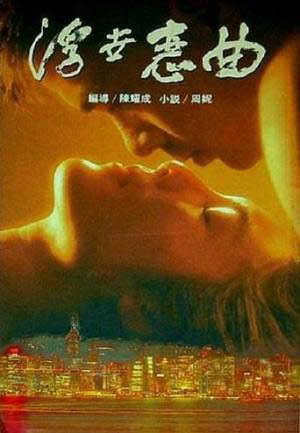To Liv(e)

Reviewed by YTSL
If quite a few Western film critics (and some
fans) are to be believed, Hong Kong cinema is famously apolitical, and maybe
even downright anti-political. Although this (re)viewer most certainly
does not see politicized perspectives and commentary in as many movies from
the former British crown colony (and present day Special Administrative Region
of the People’s Republic of China) as the likes of the community college
instructor authors of one of her least favorite books on the “Fragrant Harbour”’s
cinematic output, she will maintain that she has viewed her share of politics
saturated as well as tinged Hong Kong works. For the record, these
include many of Tsui Hark’s efforts along with that of the likes of Ann Hui
and Fruit Chan. Additionally, there’s this bold 1992 offering from
Evans Chan that is all the better for feeling distinctly personal as well
as political.

TO LIV(E) takes its title from its protagonist’s undertaking to write a series
of letters to Liv Ulmann protesting many a Westerner’s -- including the Norwegian
actress as well as the Pope’s -- criticism of Hong Kong’s 1990 deportation
of 51 Vietnamese refugees. In the process, first time director and
scriptwriter Evans Chan -- primarily by way of a thoughtful and clearly intelligent
woman named Rubie (who is sophisticatedly portrayed by the Golden Horse Best
Actress award winning Lindzay Chan) -- also manages to draw attention to
the post 1989 Tiananmen Square massacre and pre-1997 Handover lives, fears,
cares and woes of those Hong Kong residents who had perhaps really only lately
come to the disquieting realization that “We are not British subjects.
We are only British objects” and were dark humoredly entertaining the idea
that there would soon be Hong Kong -- not just Vietnamese -- boat people.

As Rubie explains in one of her epistles to the European celebrity who she
had previously only known from watching Ingmar Bergmann films, “We, the people
of Hong Kong, are still trying to pick up the pieces of our shattered dreams
from the Tienanmen Square”. Hence her feeling that “[Ulmann’s and the
other protestors’] timing is so wrong”. Furthermore, as it gets pointed
out in TO LIV(E), it’s not as though Hong Kong had been entirely callous
or irresponsible with regards to the plight of the Vietnamese refugees (whose
reasons for leaving their home were economic as well as solely political,
due to the U.S. placed an economic embargo on that communist country).
Instead, as the designated “Port of First Asylum” for those people, Hong
Kong had actually been shouldering a disproportionately large share of the
substantial financial and related refugee burden on behalf of the verbally
but not otherwise particularly activist (with regards to this matter) international
community.

Another contentious issue that comes to the fore in TO LIV(E) is the different
reactions that the avowedly humanitarian foreigners had to the British crown
colony’s no less forced repatriation of Chinese refugees back to their somehow
more internationally acceptably communist-ruled land. Suffice to say
at this juncture that, together with the previously mentioned others, it
does appear to have been discussed and presented in a way that can be eye-opening
-- especially on account of it being examined within a larger context of
general West-East relations -- as well as is appropriately nuanced.
Also, that the assured quality of the general coverage would already be an
achievement for a documentary type work that was entirely devoted to highlighting
these topics but is even more impressive when it is realized that this dramatic
effort also allocates some of its playing time to trying to make us feel
for a group of characters who, other than British born Hong Kong Urban Councilor
Elsie Tu, are fictional (but have personal concerns plus political perspectives
-- even if not actual personalities -- that likely resemble certain real life
individuals with whom this offering’s auteur is acquainted).

To be sure though, there probably will be some viewers of TO LIV(E) whose
opinion of the structurally experimental film would have been higher if it
had concentrated on the letter writing Rubie and her efforts to communicate
that “Hong Kong’s not as repulsive as [those who don’t really know it can]
make it out to be”. For my part, I could have done without the histrionics
that emanated from Rubie’s mother, and the considerable leap of faith that
was required of this Willy Tsao produced effort’s viewer as a result of the
earthy Ha Ping and Ma Pa Nu having been cast as the parents of someone like
the classy British English accented as well as Eurasian appearing -- because
that is what she really is, after all -- Lindzay Chan. On the other
hand, I do appreciate that the presence in this admirable offering of Rubie’s
artist boyfriend (John is played by Fung Kin Chung), her younger brother
(Tony is essayed by Anthony Wong Yiu Ming) and the older woman he loves (Josephine
Koo’s portrayal of the often melancholic Teresa netted her a Golden Horse
Best Supporting Actress prize) does help to show that fateful decisions to
move away from or remain in one’s home territory are never reached without
some kind of emotional push or pull factor needing to be factored into the
equation.
My rating for the film: 8.





